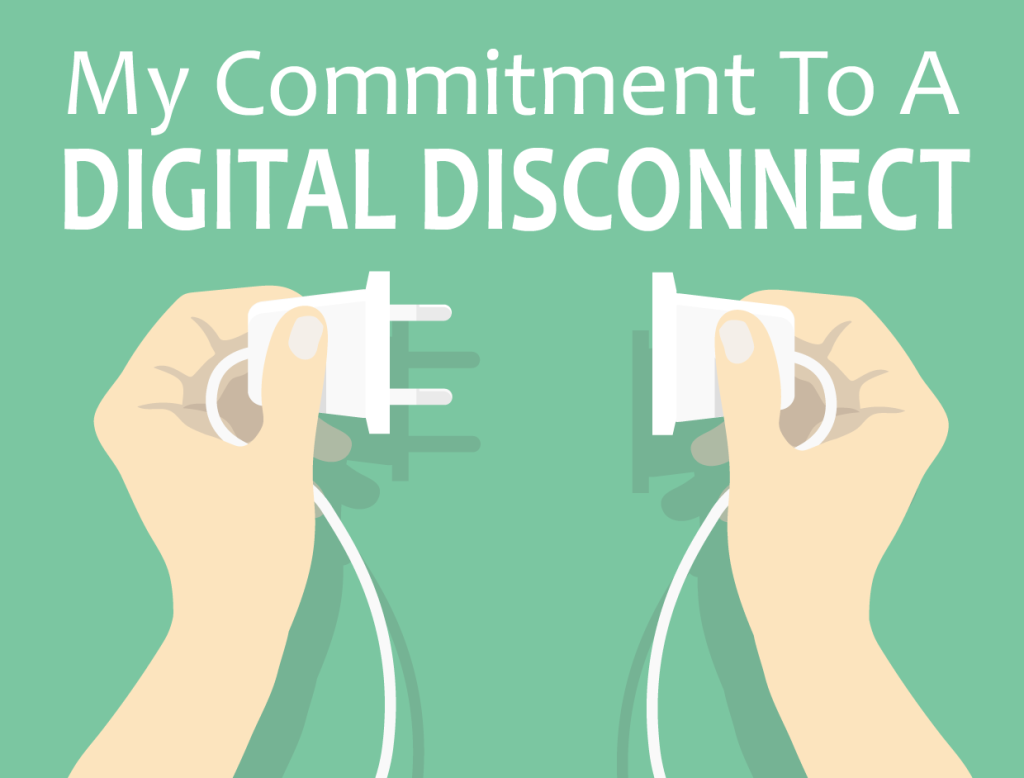Digital disconnection has become a pressing concern in today’s tech-driven society, where the incessant streams of information can overwhelm our mental health. As social media effects intensify, individuals find it increasingly difficult to decipher what is real and what has been artificially curated. The constant bombardment of data leads to feelings of cognitive dissonance, leaving many yearning for a reprieve from the chaos. In this age of information overload, the impact of AI influence on reality is profound, as our perceptions are shaped by algorithms that prioritize engagement over authenticity. Addressing digital disconnection is essential not only for preserving our sanity but also for fostering genuine connections in an ever-evolving digital landscape.
The phenomenon of stepping back from technology, often referred to as digital detox, speaks volumes about the mental strain that comes from being constantly connected. Many individuals experience a tumultuous relationship with their devices, feeling the need to reevaluate their screen time as they navigate an environment saturated with digital noise. The adverse effects of pervasive connectivity can manifest in various ways, impacting mental well-being and interpersonal relationships. As we delve deeper into the complexities of our interactions with the digital realm, it is crucial to examine our habits and the psychological toll of being perpetually online. Finding a balance between engagement and disconnection may prove vital in reclaiming our sense of reality and peace.
The Impact of Digital Disconnection on Mental Health
In today’s hyper-connected world, the phenomenon of digital disconnection has become increasingly evident, particularly in how it affects mental health. As individuals spend more time interacting through screens rather than in person, they often find themselves grappling with feelings of isolation and depression. Extensive use of social media magnifies these effects, as users compare their reality to the curated highlights of others’ lives, leading to detrimental self-perception and cognitive dissonance. The barrage of seemingly perfect images can create an unrealistic standard that leaves many feeling inadequate.
Moreover, the constant connectivity brought by technology leads to information overload, making it challenging for individuals to process emotions and experiences comprehensively. The resulting anxiety and stress can accumulate, and individuals may develop coping mechanisms that involve further disconnection, creating a troubling cycle. By actively choosing moments of disconnection from digital platforms, individuals can recalibrate their mental states, allowing for deeper self-reflection and healthier social interactions.
Understanding the Effects of Social Media on Reality
The effects of social media on our perception of reality are profound and multifaceted. Excessive engagement with these platforms can create distorted views about the world, leading to disconnects in how we relate to our personal experiences. The sensationalism often prevalent in social media narratives can overshadow authentic information, contributing to a collective cognitive dissonance where users struggle to discern fact from fiction. In this environment, the line between reality and hyperreality becomes blurred, prompting users to react to fabricated images and misleading content as if they were genuine.
Furthermore, social media platforms actively shape our realities through algorithms designed to keep users engaged. These algorithms curate our feeds based on previous interactions, creating echo chambers that reinforce existing beliefs and perspectives, further alienating individuals from diverse thoughts. The minimization of varied discourse, coupled with the amplification of polarizing content, leads to a society that finds it increasingly difficult to engage in reasoned conversation about pressing issues, thereby complicating the challenge of finding truthful representations of reality.
Navigating Information Overload in Modern Society
In an age defined by information overload, the sheer volume of data available can be overwhelming. Individuals find themselves saturated with news, social media updates, and various forms of digital communication, leading to difficulty in processing essential information. This phenomenon, often exacerbated by our phones as the main conduits of information, results in cognitive fatigue and a heightened state of anxiety. As the digital landscape evolves to facilitate faster consumption, users may feel compelled to keep up, creating a sense of perpetual urgency that detracts from mindful engagement with content.
To effectively navigate this overload, establishing boundaries around digital consumption is crucial. Strategies such as setting specific times to check news feeds or social media, utilizing apps designed to limit screen time, and consciously curating the sources of information one engages with can significantly alleviate the burden. By prioritizing quality over quantity, individuals can step beyond the chaos of information overload and reconnect with more deliberate and enriching experiences.
AI Influence and the Perception of Reality
The advent of artificial intelligence marks a significant shift in how we perceive reality, with implications that ripple through various aspects of life. AI-generated content can contain distortions that complicate our understanding of what is authentic, as fake images and narratives proliferate online, engendering mistrust. For example, deepfake technologies can seamlessly manipulate video and audio, leading to skepticism about the veracity of digital media and contributing to the confusion surrounding real news versus fabricated information.
Additionally, AI’s role in shaping our interaction with technology itself raises questions about authenticity. As more users rely on AI for tasks ranging from writing prompts to generating creative content, there is a risk of individuals becoming detached from their abilities and perspectives. This dependency can reinforce a false reality where human creativity is undervalued, fostering disengagement from genuine human experiences and interactions, ultimately contributing to the erosion of meaningful social connections.
Cognitive Dissonance in the Digital Age
Cognitive dissonance refers to the psychological discomfort experienced when confronted with conflicting beliefs or values. In the digital age, this phenomenon is magnified by the constant flow of dissonant information that users encounter. Social media platforms and news outlets present varying narratives and perspectives on issues, pushing individuals to grapple with their beliefs in a world where misinformation thrives. This conflict can lead to mental fatigue, as users seek to reconcile their pre-existing beliefs with new, often contradictory information.
Over time, this dissonance may result in an unhealthy coping strategy where individuals opt for echo chambers that reaffirm their beliefs, avoiding more challenging conversations and critical thinking. The cyclical nature of this behavior perpetuates a simplified understanding of complex issues, as users become increasingly polarized in their views. Engaging in self-reflection and fostering open dialogues can help bridge the gap of dissonance, allowing for a broader appreciation of diverse perspectives and fostering meaningful social interactions.
Reclaiming Authenticity in an AI-Driven World
In an increasingly AI-driven world, the quest for authenticity has become a pressing concern. As users encounter more AI-generated content, the challenge lies in discerning what is genuine. The allure of AI-enhanced experiences can lead to a detachment from authentic interactions, jeopardizing the essence of human communication and creativity. For example, while AI can streamline tasks and enhance artistic endeavors, it can also dilute personal expression by creating an environment where users are more prone to imitation than innovation.
To reclaim authenticity, individuals must cultivate spaces that prioritize human connection—moments where we engage without digital filters. This might involve setting aside time for face-to-face interactions, embracing hobbies that foster creativity without technological interference, or actively engaging with art and literature that reflect genuine human experiences. By fostering these authentic connections, we not only combat the influence of AI but also nourish our capacity for empathy and creativity.
The Role of Mental Health Awareness in Digital Spaces
Awareness surrounding mental health is crucial in navigating today’s digital landscapes, where the interplay of social media and technology can significantly impact one’s well-being. This understanding prompts a social responsibility among platforms and users alike to consider the psychological effects of consistent digital engagement. Users face heightened anxiety and stress levels due to comparisons, cyberbullying, and the relentless pressure to project an idealized version of oneself online, often leading to deterioration of mental health.
Addressing this issue calls for collective efforts to foster supportive digital environments that prioritize mental health. Initiatives may include employing algorithms that highlight positive content, implementing features that encourage breaks, or promoting mental health resources within platforms. By embracing awareness and compassion in our digital interactions, we can create spaces that not only inform but also uplift and support the mental health of individuals navigating the complexities of social media.
Recognizing the Illusions Created by Technology
Technology’s ability to create illusions significantly shapes our understanding of reality. AI-generated images and deepfakes can present entirely fabricated experiences that blur the lines between the real and the unreal, leaving users questioning the authenticity of their interactions. This blurring can lead to a society that increasingly struggles with trust, particularly as misinformation spreads rapidly across digital channels. The challenge lies in distinguishing between genuine experiences and those manufactured by technology.
To counteract these illusions, fostering media literacy becomes imperative. By equipping individuals with the skills to critically evaluate the sources and content they encounter, we empower them to navigate a world rife with misinformation and deceptive narratives. Encouraging critical thinking around media consumption not only enhances discernment but also cultivates an environment where genuine human experience can reclaim its place amidst the cacophony of digital noise.
The Psychological Impact of Political Discourse Online
Political discourse in the digital realm can wield profound psychological effects on individuals and society. The rapid dissemination of information, coupled with often emotionally charged narratives, can provoke stress and anxiety in users. During times of political turmoil, social media can serve as a double-edged sword, enabling vital conversations while simultaneously amplifying division and hostility. This phenomenon can create an overwhelming environment where individuals feel compelled to react or engage without full consideration of the implications, resulting in cognitive dissonance and mental strain.
To navigate this landscape, individuals must strive to approach political content and discourse with mindfulness, prioritizing emotional well-being. Engaging in thoughtful conversations—either digitally or in person—while taking intentional breaks from heated discussions can help mitigate the psychological burden of political engagement. By balancing awareness of current issues with self-care practices, individuals can participate in social dialogues while maintaining their mental health.
Frequently Asked Questions
What are the effects of digital disconnection on mental health and technology use?
Digital disconnection can significantly boost mental well-being by reducing symptoms of anxiety and depression associated with constant social media use. By stepping away from screens, individuals can reconnect with their emotions, decrease feelings of loneliness, and improve their focus, ultimately fostering a healthier relationship with technology.
How does digital disconnection help mitigate information overload?
Digital disconnection serves as a necessary break from the incessant flow of information online, allowing the brain to recharge. This respite reduces cognitive dissonance caused by conflicting information and enhances one’s ability to process and engage with content meaningfully upon return.
Why is it important to disconnect from social media in relation to mental health and technology?
Disconnecting from social media is crucial for mental health as it helps diminish feelings of inadequacy and comparison that often arise from curated online personas. By embracing digital disconnection, users can reclaim time for self-reflection and meaningful offline interactions, promoting a healthier balance between the digital and real world.
What role does AI play in distorting our perception of reality and the need for digital disconnection?
AI can create hyper-realistic images and manipulate information, further blurring the lines between reality and perception. This distortion can lead to confusion and mistrust in what we know as reality, reinforcing the necessity of digital disconnection to restore clarity and grounding in our everyday lives.
How can practicing digital disconnection lead to improved cognitive clarity?
Engaging in digital disconnection allows individuals to escape the distractions of technology, thus providing mental space for deeper thought and reflection. This practice can alleviate cognitive dissonance, enhance focus, and encourage a more coherent understanding of one’s experiences and surroundings.
| Key Point | Details |
|---|---|
| Digital Disconnection | The feeling of disconnection from reality is exacerbated by constant digital engagement. |
| Cognitive Overload | The rapid pace of information leads to confusion and a lack of meaningful processing of events. |
| Dissociation from Reality | Reliance on digital devices creates an illusion of control over time and reality. |
| Media Saturation | The overwhelming amount of content leads to a numbing of the emotional response to serious issues. |
| Artificial Intelligence and Digital Legacy | AI-generated content and images lead to skepticism about what constitutes reality. |
| Impact on Personal Relationships | Digital tools may be impairing genuine human interactions and increasing loneliness. |
Summary
Digital disconnection has become a prevalent phenomenon, as individuals find themselves increasingly detached from reality due to relentless engagement with technology. The cognitive overload from endless streams of information can lead to confusion and a sense of dissociation from one’s surroundings. Many people report feeling numb to critical news and events, as the sheer volume of content creates an emotional barrier to meaningful engagement. As artificial intelligence continues to blur the lines between real and fake, it raises significant concerns about our understanding of truth and reality. Ultimately, the stakes are high as we navigate a society where digital disconnection deeply impacts personal relationships and our collective grasp on the truth.



